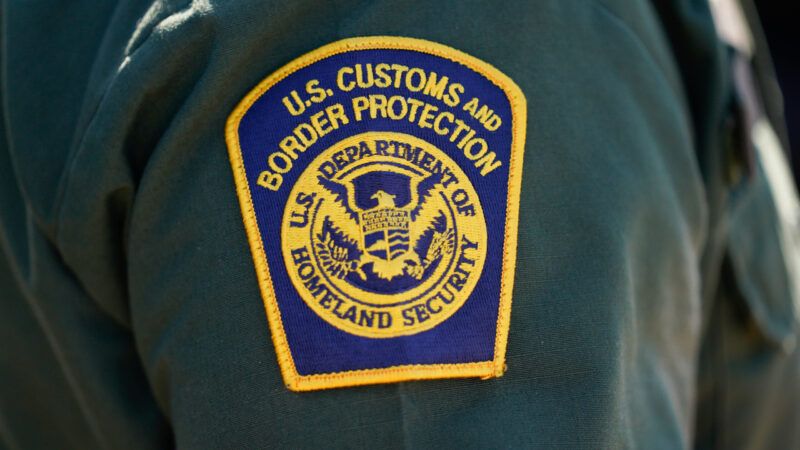A Border Patrol Agent Assaulted Him and Violated His First Amendment Rights. He May Never Get To Sue.
It is almost impossible to hold a rogue federal officer accountable. The Supreme Court may make it even harder.

Federal government agents should not have free rein to violate the rights of the public with impunity. That's the uncontroversial premise behind a spate of petitions before the U.S. Supreme Court that pertain to law enforcement officers who breached clearly established law, and whose victims want to seek recourse.
Recourse can prove elusive, if not impossible.
The Court has yet to announce if it will hear two of those cases. The first pertains to a federal officer who devised a fake sex trafficking ring and jailed a teenage girl on bogus charges for two years. The second involves a Department of Homeland Security (DHS) agent who, outside of a bar, tried to shoot a man he had a personal issue with. Federal courts in both cases found that the two government agents violated clearly established law but are protected by absolute immunity and thus cannot be sued solely because of their status with the federal government.
But one similar case has worked its way up to the justices, who are scheduled to hear it on March 2—though it appears they may be poised to make it even more difficult for victims of federal government abuse to achieve any meaningful remedy when their rights are violated.
In 2014, U.S. Border Patrol Agent Erik Egbert followed a man to a bed and breakfast where he was staying in Washington state. That man was from Turkey, and Egbert assumed the guest may have come to the U.S. illegally based on the inn's proximity to the Canadian border.
He was incorrect. But Egbert pursued the man and declined to leave the private property after its owner, Robert Boule, requested that he do so. In response, Egbert pushed Boule into a car and then to the ground, ultimately resulting in injuries to Boule's back that required medical treatment. Boule subsequently filed a complaint with Egbert's supervisor, which the Border Patrol agent countered with threats to sic the IRS on him with a business audit—a promise he made good on.
It's been almost eight years, and Boule has not yet had his day in court, having spent the better part of the last decade asking the government for the privilege to appear before a jury and ask for damages. Thus far, he's been successful: Both the district court and the U.S. Court of Appeals for the 9th Circuit sided with Boule and said he should have the opportunity to bring a civil suit against Egbert for infringing on his First and Fourth Amendment rights.
That shouldn't be surprising. Under a 1971 Supreme Court precedent—Bivens v. Six Unknown Named Agents of Federal Bureau of Narcotics—federal agents may be sued when they violate someone's rights. But in recent years, the high court has proceeded to dilute its own decision in significant ways, now requiring that federal agents may not be sued if a federal judge pinpoints "special factors counseling hesitation." You can see where such a subjective standard might go awry.
It was that standard that shielded Officer Heather Weyker, who conjured the sex trafficking ring, and DHS Agent Ray Lamb, whose gun jammed when he attempted to shoot the man he had a feud with. Neither one received qualified immunity, the legal doctrine that protects certain government officials from civil liability if the way in which they misbehaved has not been "clearly established" in a prior court ruling. Weyker and Lamb did violate the law, as the courts acknowledged. Yet although they were denied qualified immunity, they received absolute immunity and can't be sued simply because of their status as a federal employee—something that should signify a responsibility to protect the public, not a green light to violate their rights without fear of accountability.
Perhaps in a testament to the egregiousness of Egbert's misconduct, he did not clear the low bar passed over by Weyker and Lamb. So he is requesting that the Supreme Court lower the bar even further. A decision in Boule's favor would "undercut the ability of Border Patrol agents to fulfill their basic mission of securing the border, enforcing the immigration laws, and protecting national security," the government wrote in its petition for review, as if immigration officers must reserve the right to assault people and weaponize their power in illegal ways in order to do their jobs effectively.
"The stakes are very high," says Anya Bidwell, an attorney at the Institute for Justice, a public-interest law firm that filed an amicus brief on Boule's behalf this week. If Egbert succeeds, "this would mean no Bivens remedy in the vast majority of cases. This would mean absolute immunity for federal police and other federal officials."
Based on the Supreme Court's recent jurisprudence on the issue, it appears that scenario may be the likely outcome—giving federal agents carte blanche to break the same rules they are meant to uphold.


Show Comments (48)